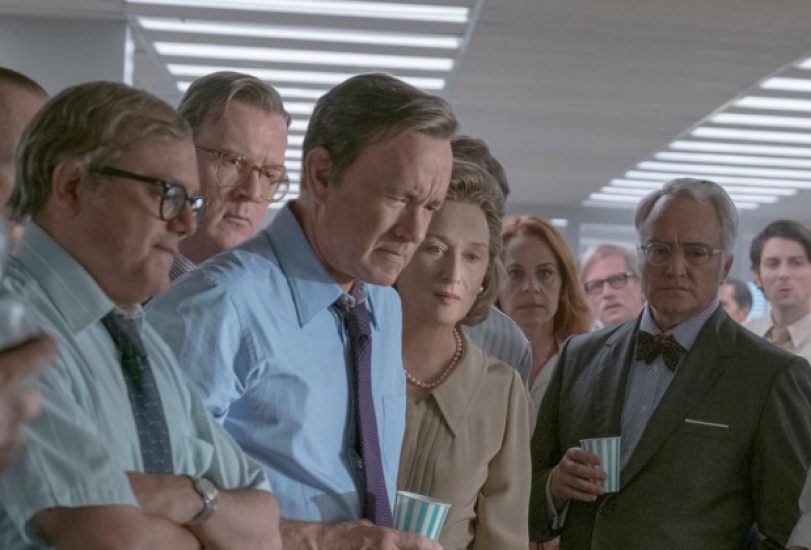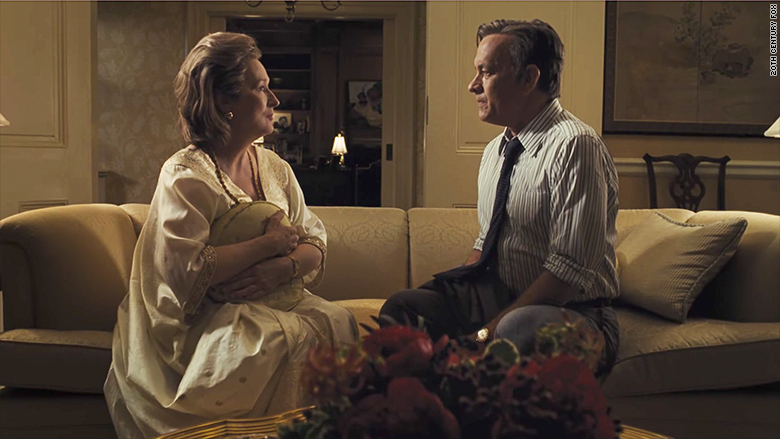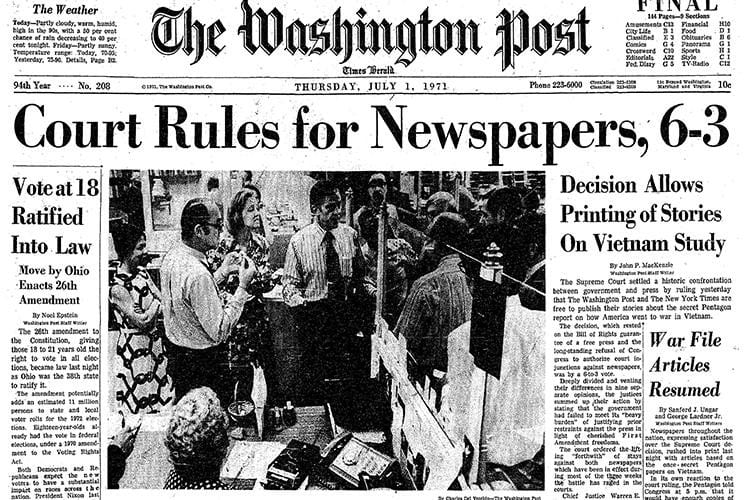Spielberg’s ‘The Post’ Will Have You Cheering For a Thom McAn Shoebox
Sure, Meryl Streep and Tom Hanks technically get the top billing in director Steven Spielberg’s “The Post” but make no mistake — the real star of this news ink stained political thriller debuting in theaters today is a Thom McAn shoe box. Turning up about 30 minutes into the film, via an engrossing Steadicam tracking shot, the cardboard box containing a portion of the Pentagon Papers completely upstages Hanks as Washington Post executive editor Ben Bradley, toiling in the background, as it makes its unceremonious entrance. With Spielberg’s adept decision to direct this as a breakneck political potboiler, paired with longtime collaborator John Williams’ typewriter key-accented, newsroom cacophony of a score, for the first time ever in the history of the movies, audiences may give a dinged up shoebox a standing ovation.
For a country dispirited by our current presidential administration, “The Post” is at once a Frank Capra-esque feel-good, rally the troops throwback and a stark, “All The President’s Men”-like reminder of what’s at stake when a president attempts to circumvent the U.S. Constitution.
Of course, many film fans may line up to see “The Post,” due to the casting of Streep and Hanks, two of our most celebrated actors co-starring in their first film together.
[amazon_link asins=’B078XMV6WJ,B07JZTJ63Z,B00407PNX8,1476770514,1501175513,1501191713,0375701044′ template=’ProductCarousel’ store=’eldredgeatl-20′ marketplace=’US’ link_id=’5a7b0fbe-0ee3-11e9-b33b-df1b124bc2a8′]
From their crackling first scene together over a breakfast meeting at a private club, seeing Streep and Hanks work together is alone worth the price of admission. Unsure of herself in the male-dominated company she now runs and preparing to take her family’s cash-strapped company public, Streep as Washington Post publisher Katharine Graham rushes into frame and immediately knocks over a chair with her briefcase (According to Streep, she accidentally did this on the first take and Spielberg loved it so much he asked her to do it in each subsequent take).
This establishing scene, setting up the Graham/Bradlee personal and professional dynamic is a master class in acting and direction, slowly revealing the nuances of the relationship between the publisher and her executive editor. There’s warmth, mutual respect and humor. But when Graham suggests Bradley reassign the reporter covering first daughter Tricia Nixon’s wedding, after receiving a phone call from Nixon aide H.R. Haldeman, Spielberg abruptly upends the friendly fraternizing. Bradley curtly tells Graham, “Katharine, keep your finger out of my eye.” Streep’s reaction shot alone should net her an Oscar nomination.
As newspaper movies as political statements go, this ranks right up there with 2015’s Boston Globe Catholic Church expose “Spotlight,” 1952’s “Deadline U.S.A.” starring Humphrey Bogart as a crusading editor and Ethel Barrymore as his publisher, writer-director Billy Wilder’s 1951 cautionary tale “Ace in the Hole” and of course, “The Post’s” unofficial cinematic bookend, “All The President’s Men.” But if “Spotlight” demonstrated the power and impact of dogged investigative reporting in 2001 as readers abandoned pay platforms for news in droves in 2015, “The Post” is rallying cry for the First Amendment from 1971 fine tailored for the era of Donald Trump’s “fake news.”
To explain the value of “The Post” in sci-fi terms, if “All The President’s Men” is “Star Wars: A New Hope,” “The Post” serves as a sort of “Star Wars: Rogue One” prequel to the Alan J. Pakula newspaper classic. But unlike Pakula’s now-sometimes molasses-paced 138-minute film, Spielberg brings a breakneck urgency to “The Post.” Like the reporters and editors rushing to hit deadline with a world-altering scoop in his film, Spielberg is an adroit rewrite man, trimming away all the extraneous bits, delivering “The Post” in an economical 116 minutes (including the eight-minute end credit crawl).
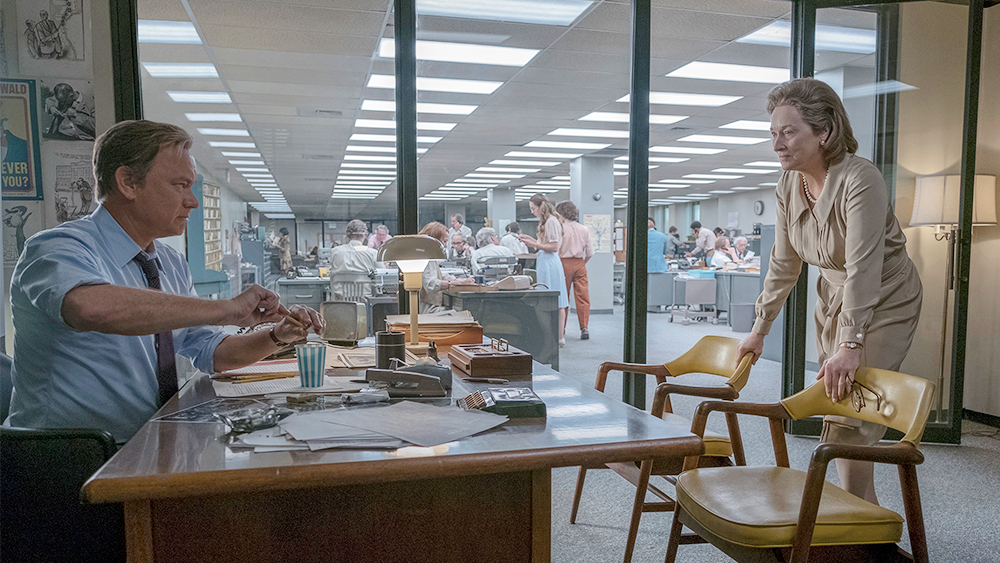
Even though the film’s targeted demographic should be well acquainted with the outcome of the Washington Post’s 1971 Pentagon Papers saga, Spielberg keeps you riveted to the action by lifting the veil on the brave, behind the scenes decision-making that resulted in one of the greatest journalistic endeavors of the 20th century.
And thanks to a pair of equally riveting memoirs, Bradlee’s 1995 “A Good Life: Newspapering and Other 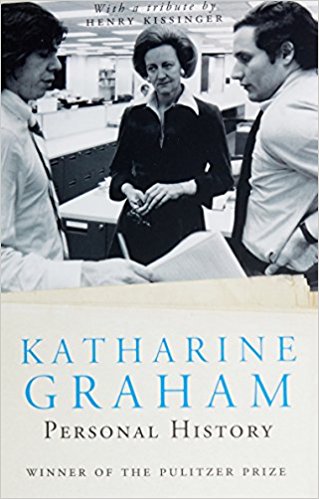 Adventures” and Graham’s weighty 643-page 1997 autobiography “Personal History,” the Post’s former executive editor and publisher helped to write the screenplay. Alone, Graham’s spellbinding account of the night she had to make the final decision to publish the papers, as lawyers and editors clustered on telephone extensions, camped out both at her house and Bradlee’s, is gripping and cinematic: ”I could tell from the passion of the editors’ views that we were in for big trouble on the editorial floor if we didn’t publish. I well remember [Post editor] Phil Geyelin’s response when I said deciding to publish could destroy the paper. ‘Yes,’ he agreed, ‘but there’s more than one way to destroy a newspaper.’”
Adventures” and Graham’s weighty 643-page 1997 autobiography “Personal History,” the Post’s former executive editor and publisher helped to write the screenplay. Alone, Graham’s spellbinding account of the night she had to make the final decision to publish the papers, as lawyers and editors clustered on telephone extensions, camped out both at her house and Bradlee’s, is gripping and cinematic: ”I could tell from the passion of the editors’ views that we were in for big trouble on the editorial floor if we didn’t publish. I well remember [Post editor] Phil Geyelin’s response when I said deciding to publish could destroy the paper. ‘Yes,’ he agreed, ‘but there’s more than one way to destroy a newspaper.’”
Spielberg also slyly slides in a few of Graham’s now-antiquated editorial standards as a lesson for digital era publishers watching “The Post” in 2018. Early on Streep as Graham, the freshly installed publisher of the Washington Post after her husband commits suicide, is grilled about why she’s spending so much money in the newsroom. Her steely reply: “Quality and profitability go hand in hand.” In 2018, unless you’re global online retailer Amazon CEO and current Washington Post owner Jeff Bezos, those journalistic standards have long been abandoned in the age of slashed budgets, clicks, hits and page impressions. For those of us still working in journalism, “The Post” delivers a much-needed shot of B12 to our backsides as it reminds us why we got into this career in the first place.

And when the Nixon White House orders the New York Times to stop publishing the government secrets that reveal every president from Harry Truman to Nixon himself was complicit in keeping the true nature of the U.S. involvement in Vietnam (and its ultimate failure) from the American people, Spielberg’s direction is as subtle as a sledgehammer. Hanks, as Bradlee (complete with the executive editor’s signature swoop of hair) prophetically growls, “The president is taking a shit all over the First Amendment.” Comparisons to our current president’s war on the press, referring to reporters as “an enemy of the people” and nonchalantly threatening NBC’s FCC license via tweet are unavoidable.
At its most jaw-dropping, “The Post” is a potent reminder of how paramount —and just how vulnerable — a free press is in our democracy. Fittingly, Spielberg uses actual audio from Richard Nixon’s own chilling Oval Office phone calls plotting against the press to deliver his point home, tightly wrapped with a rubber band at the end of each moviegoer’s mental driveway.
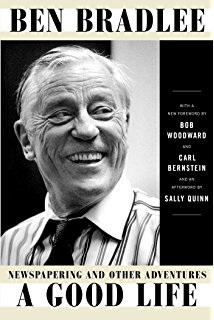 As Bradlee himself reflected in his memoir “A Good Life”: “For the first time in the history of the American republic, newspapers had been restrained by the government from publishing a story — a black mark in the history of democracy. We had won — sort of.”
As Bradlee himself reflected in his memoir “A Good Life”: “For the first time in the history of the American republic, newspapers had been restrained by the government from publishing a story — a black mark in the history of democracy. We had won — sort of.”
As “The Post” brilliantly depicts, the Pentagon Papers episode forever bonded Graham and Bradlee. The publisher recounted in her autobiography, the two had a tradition of writing each other love notes each Christmas. In 1971, Christmas came early at the Washington Post. On the day the Supreme Court ruled in favor of the Post and the Times, Graham wrote Bradlee, “This was only possible because of the extra 10% of the 110% that you and those under you put into it.” Bradlee’s reply? “Doing business with you is so much more than a pleasure — it’s a cause, it’s an honor and such a rewarding challenge. I’m not sure I could handle another one of these tomorrow, but it is so great to know this whole newspaper will handle the next one with courage and commitment and style.”
In the closing frames of “The Post” as the camera zooms in on a taped stairwell door inside the darkened halls of the Watergate building in Washington D.C., Spielberg reveals Bradlee and Graham’s ultimate battle was but a year away.
Last week, The Hollywood Reporter reported the Trump White House has requested a private screening of “The Post.” 20th Century Fox, Participant Media, DreamWorks Pictures and Steven Spielberg himself should not only immediately accommodate that request but they should offer to put the film on a continuous loop in the White House screening room.
The ghost of Richard Nixon might well teach the Oval Office’s current occupant an invaluable lesson about the perils of interfering with the free press and what happens when you lie to the American people.
“The Post” is now open in metro-Atlanta theaters.

Richard L. Eldredge is the founder and editor in chief of Eldredge ATL. As a reporter for the Atlanta Journal-Constitution and Atlanta magazine, he has covered Atlanta since 1990.

